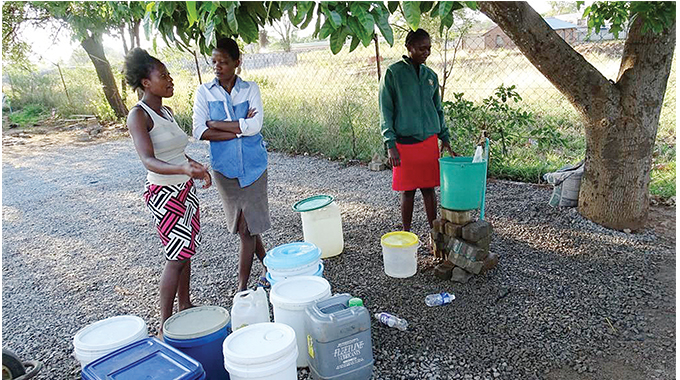Car wash bails out residents in water crisis

Kamangeni Phiri
A borehole meant to sustain a car-wash business in Paddonhurst suburb in the water-starved city of Bulawayo is helping prop up a flagging public health system.
Each time the city council turns off its water taps the residents make a beeline for Busy Corner Car Wash to access the precious liquid.
“No one is turned away. All containers are filled up regardless of the day and time. This is a welcome development for us individuals who do not have boreholes at our properties,” says Mrs Martha Moyo (60) a resident.
For a long time, Mrs Moyo, together with the other women and girls from her area, fetched water from a hand-pump borehole nearly 2km away. The borehole water was long condemned by authorities as unsafe for drinking as it is located only a few meters from the infamous heavily polluted stream, “Mazai River”.
The women and girls also have to cross the busy Bulawayo-Harare highway first before getting to the borehole.
“The place is dangerous especially at night. It’s in a bushy area and people have been mugged before while going to the borehole in the evenings. We are however grateful to the car wash owner for bringing fresh water closer to our homes, especially at a time when we are battling to contain the Covid-19 pandemic,” says Mrs Moyo.
The borehole which was recently connected to electricity, has opened up fresh possibilities for Paddonhurst women.
Less time and energy is now being spent on fetching water.
“We now have more time for household chores, leisure and study,” enthused a young mother, Ms Portia Chiwande.
Ms Chiwande said the new water source was an empowerment tool and confidence booster to women.
With ease access to water, she says, women are now able to engage in self-empowerment project.
“Some of us now have time to engage in projects like back-yard chicken rearing.
We often bear the brunt of water shortages as women. Whenever there are such challenges, we spend more time away from home searching for the precious liquid. We need water more because our own hygiene issues are different from men’s,” she says.
A garden enthusiast, Mrs Emily Musinga, is using the borehole water to revive her vegetable garden project.
“My vegetables had withered. I love fresh vegetables but we cannot afford to buy them regularly at the market,” she says.
The Paddonhurst borehole pumps between 22 500 and 30 000 litres of water per day to 100 people.
In May this year, the car wash director, Mr Simbarashe Madzivire (35), decided to invest in a borehole as a backup water source to his business in the wake of the city’s dwindling water supplies.
“I invested more than US$2 500 in the project. Drilling, pumps and controllers alone cost $1 650. The borehole was mainly meant to benefit our car wash business. You cannot run a car wash without water. However, residents also need water and we decided to assist our community at no cost. It is only natural to do so,” he says.
Mr Madzivire also owns a supermarket at the local shopping centre. He said giving residents access to the borehole was part of his business’ corporate social responsibility.
“As a country we are going through tough times because of the Covid-19 pandemic. Water is a key resource needed in containing the pandemic. We need to be washing hands regularly and we also need to maintain a clean environment,” said Mr Madzivire.
The philanthropic emerging businessman is providing free potable water to 300 households in the medium-density suburb.
He plans to extend the kind gesture to residents of neighbouring suburbs of Sunnyside and Romney Park.
“We want to assist more women. It is women who bear the brunt most whenever a community experiences water shortages. I hope more business players out there will come up with their own initiatives to assist communities in their respective areas,” said Mr Madzivire.
Two water tanks with a combined carrying capacity of 7 500 litres were installed to ensure there is water all the time regardless of power outages.
Residents and shop owners at the local shopping centre have unrestricted access to the water.
While residents get the water for free, business pay a token fee that goes towards settling the electricity bill.
“We keep our gates open 24 hours a day. This is meant to help reduce the problem of crowding within our premises,” says Mr Madzivire.
The youthful businessman is also using the water to spruce up the image of the shopping complex. He has planted lawn and flowers turning part of the area into a beautiful park.
Mr Madzivire said his car wash team always ensures that residents observe social distancing and wear face masks in line with the WHO guidelines on Covid-19.
There are, however, rare occasions when people stampede for water and fail to observe social distancing. A few others disregard wearing masks.
“At times,” says Mr Madzivire, “we even get selfish individuals who want to fill as many as eight drums while others with a few small containers are kept waiting in the queue forever. But we are always there to ensure everyone gets the precious liquid.”
Zimbabwe’s second capital is fast becoming notorious for its collapsing public health system.
The city council introduced a tight water shedding regime last year as its pumping capacity is failing to cope with the growing population. The local authority first introduced a two-day water shedding per week. It gradually increased the water shedding schedule to a 96-hour (four day) weekly and finally to the crippling 144 hours (six days) per week.
However, the City Fathers have shown little respect for their own advertised water schedules. Sometimes the water shedding stretches for weeks and even months on end, compromising sanitation.
Residents in some of the western suburbs have gone for months without council water forcing residents to turn to unprotected sources.
In June, the city was hit by a diarrhoea outbreak that claimed 13 lives mostly from Luveve suburb and infected close to 2 000 people.
Fresh diarrhoea cases were reported this month in Mzilikazi Clinic, Makokoba and Nguboyenja as 100 people were confirmed to have contracted the disease.
Bulawayo Health Services director, Dr Edwin Sibanda, told Chronicle recently that the council suspected the non-availability of clean water to have caused the diarrhoea outbreak.
“You’ll realise that Mzilikazi and Makokoba had been spared from water cuts. But of late they have been affected and shortage of water could have contributed to it (the outbreak). But we are yet to verify the positive organism,” he said.
Bulawayo Progressive Residents Association co-ordinator, Mr Emmanuel Ndlovu said the local authority should just admit it has failed to provide water to residents.
Individuals like Mr Madzivire can only do little in fixing the city’s failing public health system despite their good intentions.
Is there hope for the City of Bulawayo to find a lasting solution to its perennial water woes that goes beyond the rhetoric?
Only time will tell.









Comments